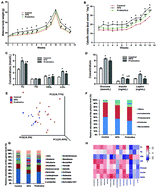当前位置:
X-MOL 学术
›
Food Funct.
›
论文详情
Our official English website, www.x-mol.net, welcomes your feedback! (Note: you will need to create a separate account there.)
Diet induced maternal obesity affects offspring gut microbiota and persists into young adulthood
Food & Function ( IF 6.1 ) Pub Date : 2018-07-11 , DOI: 10.1039/c8fo00444g Yanjie Guo 1, 2, 3, 4, 5 , Zhenling Wang 5, 6, 7, 8 , Liang Chen 5, 9, 10 , Li Tang 1, 2, 3, 4, 5 , Shu Wen 1, 2, 3, 4, 5 , Yinhui Liu 1, 2, 3, 4, 5 , Jieli Yuan 1, 2, 3, 4, 5
Food & Function ( IF 6.1 ) Pub Date : 2018-07-11 , DOI: 10.1039/c8fo00444g Yanjie Guo 1, 2, 3, 4, 5 , Zhenling Wang 5, 6, 7, 8 , Liang Chen 5, 9, 10 , Li Tang 1, 2, 3, 4, 5 , Shu Wen 1, 2, 3, 4, 5 , Yinhui Liu 1, 2, 3, 4, 5 , Jieli Yuan 1, 2, 3, 4, 5
Affiliation

|
Accumulating evidence suggests that diet could shape the host gut microbiome composition. Herein, we investigated the effects of maternal high fat diet (HFD) consumption on the gut microbiota and serum profile of mice offspring, and attempted to explore the beneficial roles of maternal probiotics intervention. Female C57BL/6J mice were fed with normal diet, HFD or HFD with daily probiotics (B. breve DM8310, L. acidophilus DM8302, L. casei DM8121 and S. thermophilus DM8309) by gavage starting 6 weeks prior to breeding and continued throughout gestation and lactation. Pups of HFD dams had higher levels of total cholesterol (TC), low-density lipoprotein (LDL), glucose, insulin and leptin compared to those of chow-fed dams. Maternal probiotics intervention resulted in a decrease in the lipid levels in all the pups, while the glucose, insulin and leptin levels were decreased only in adult female pups compared to those from HFD-fed dams; the decreased levels were similar to those in the pups of chow-fed dams. In line with these plasma changes, maternal HFD persistently altered the composition of the offspring gut microbiota in a sex specific way. Maternal probiotics intervention could ameliorate gut microbiota dysbiosis in the offspring. Such intervention showed better effects particularly for the female pups at adulthood. In conclusion, maternal HFD-induced gut microbiota dysbiosis and metabolic disorder could persist through the adulthood of the offspring. Maternal probiotics intervention can negate the detrimental effects of maternal HFD on the gut microbiota and metabolism in the offspring in a sex specific way.
中文翻译:

饮食引起的孕妇肥胖会影响后代肠道菌群并持续到成年后
越来越多的证据表明,饮食可以改变宿主肠道微生物组的组成。在这里,我们调查了母体高脂饮食(HFD)消耗对小鼠后代肠道菌群和血清状况的影响,并试图探索母体益生菌干预的有益作用。给雌性C57BL / 6J小鼠喂食正常饮食,HFD或每日补充益生菌的HFD(短双歧杆菌DM8310,嗜酸乳杆菌DM8302,干酪乳杆菌DM8121和嗜热链球菌DM8309)在繁殖前6周开始进行管饲,并在整个妊娠和哺乳期持续进行。与自给自足的大坝相比,HFD大坝的幼犬的总胆固醇(TC),低密度脂蛋白(LDL),葡萄糖,胰岛素和瘦素的含量更高。母体益生菌干预导致所有幼崽的脂质水平均降低,而与HFD喂养大坝相比,仅成年雌性幼崽的葡萄糖,胰岛素和瘦素水平降低;降低的水位与用粗饲料喂养的水坝的幼犬相似。与这些血浆变化相一致,母体HFD以特定性别的方式持续改变后代肠道菌群的组成。产妇益生菌干预可以减轻后代肠道微生物群的营养不良。这种干预措施显示出更好的效果,尤其是对于成年雌性幼崽。总之,母体HFD引起的肠道菌群失调和代谢异常可能会持续到子代成年。产妇益生菌干预可以以性别特定的方式消除产妇HFD对后代肠道菌群和代谢的有害影响。
更新日期:2018-08-15
中文翻译:

饮食引起的孕妇肥胖会影响后代肠道菌群并持续到成年后
越来越多的证据表明,饮食可以改变宿主肠道微生物组的组成。在这里,我们调查了母体高脂饮食(HFD)消耗对小鼠后代肠道菌群和血清状况的影响,并试图探索母体益生菌干预的有益作用。给雌性C57BL / 6J小鼠喂食正常饮食,HFD或每日补充益生菌的HFD(短双歧杆菌DM8310,嗜酸乳杆菌DM8302,干酪乳杆菌DM8121和嗜热链球菌DM8309)在繁殖前6周开始进行管饲,并在整个妊娠和哺乳期持续进行。与自给自足的大坝相比,HFD大坝的幼犬的总胆固醇(TC),低密度脂蛋白(LDL),葡萄糖,胰岛素和瘦素的含量更高。母体益生菌干预导致所有幼崽的脂质水平均降低,而与HFD喂养大坝相比,仅成年雌性幼崽的葡萄糖,胰岛素和瘦素水平降低;降低的水位与用粗饲料喂养的水坝的幼犬相似。与这些血浆变化相一致,母体HFD以特定性别的方式持续改变后代肠道菌群的组成。产妇益生菌干预可以减轻后代肠道微生物群的营养不良。这种干预措施显示出更好的效果,尤其是对于成年雌性幼崽。总之,母体HFD引起的肠道菌群失调和代谢异常可能会持续到子代成年。产妇益生菌干预可以以性别特定的方式消除产妇HFD对后代肠道菌群和代谢的有害影响。



























 京公网安备 11010802027423号
京公网安备 11010802027423号